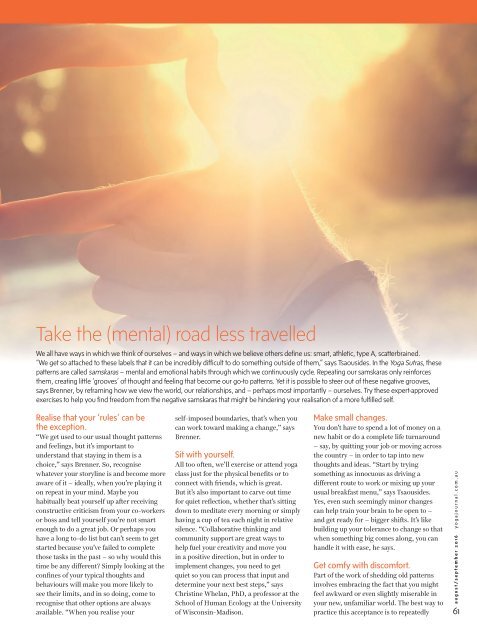Australian_Yoga_Journal_2016_08_09_downmagaz.com
You also want an ePaper? Increase the reach of your titles
YUMPU automatically turns print PDFs into web optimized ePapers that Google loves.
Take the (mental) road less travelled<br />
We all have ways in which we think of ourselves – and ways in which we believe others define us: smart, athletic, type A, scatterbrained.<br />
“We get so attached to these labels that it can be incredibly difficult to do something outside of them,” says Tsaousides. In the <strong>Yoga</strong> Sutras, these<br />
patterns are called samskaras – mental and emotional habits through which we continuously cycle. Repeating our samskaras only reinforces<br />
them, creating little ‘grooves’ of thought and feeling that be<strong>com</strong>e our go-to patterns. Yet it is possible to steer out of these negative grooves,<br />
says Brenner, by reframing how we view the world, our relationships, and – perhaps most importantly – ourselves. Try these expert-approved<br />
exercises to help you find freedom from the negative samskaras that might be hindering your realisation of a more fulfilled self.<br />
Realise that your ‘rules’ can be<br />
the exception.<br />
“We get used to our usual thought patterns<br />
and feelings, but it’s important to<br />
understand that staying in them is a<br />
choice,” says Brenner. So, recognise<br />
whatever your storyline is and be<strong>com</strong>e more<br />
aware of it – ideally, when you’re playing it<br />
on repeat in your mind. Maybe you<br />
habitually beat yourself up after receiving<br />
constructive criticism from your co-workers<br />
or boss and tell yourself you’re not smart<br />
enough to do a great job. Or perhaps you<br />
have a long to-do list but can’t seem to get<br />
started because you’ve failed to <strong>com</strong>plete<br />
those tasks in the past – so why would this<br />
time be any different? Simply looking at the<br />
confines of your typical thoughts and<br />
behaviours will make you more likely to<br />
see their limits, and in so doing, <strong>com</strong>e to<br />
recognise that other options are always<br />
available. “When you realise your<br />
self-imposed boundaries, that’s when you<br />
can work toward making a change,” says<br />
Brenner.<br />
Sit with yourself.<br />
All too often, we’ll exercise or attend yoga<br />
class just for the physical benefits or to<br />
connect with friends, which is great.<br />
But it’s also important to carve out time<br />
for quiet reflection, whether that’s sitting<br />
down to meditate every morning or simply<br />
having a cup of tea each night in relative<br />
silence. “Collaborative thinking and<br />
<strong>com</strong>munity support are great ways to<br />
help fuel your creativity and move you<br />
in a positive direction, but in order to<br />
implement changes, you need to get<br />
quiet so you can process that input and<br />
determine your next best steps,” says<br />
Christine Whelan, PhD, a professor at the<br />
School of Human Ecology at the University<br />
of Wisconsin-Madison.<br />
Make small changes.<br />
You don’t have to spend a lot of money on a<br />
new habit or do a <strong>com</strong>plete life turnaround<br />
– say, by quitting your job or moving across<br />
the country – in order to tap into new<br />
thoughts and ideas. “Start by trying<br />
something as innocuous as driving a<br />
different route to work or mixing up your<br />
usual breakfast menu,” says Tsaousides.<br />
Yes, even such seemingly minor changes<br />
can help train your brain to be open to –<br />
and get ready for – bigger shifts. It’s like<br />
building up your tolerance to change so that<br />
when something big <strong>com</strong>es along, you can<br />
handle it with ease, he says.<br />
Get <strong>com</strong>fy with dis<strong>com</strong>fort.<br />
Part of the work of shedding old patterns<br />
involves embracing the fact that you might<br />
feel awkward or even slightly miserable in<br />
your new, unfamiliar world. The best way to<br />
practice this acceptance is to repeatedly<br />
august/september <strong>2016</strong> yogajournal.<strong>com</strong>.au<br />
61


